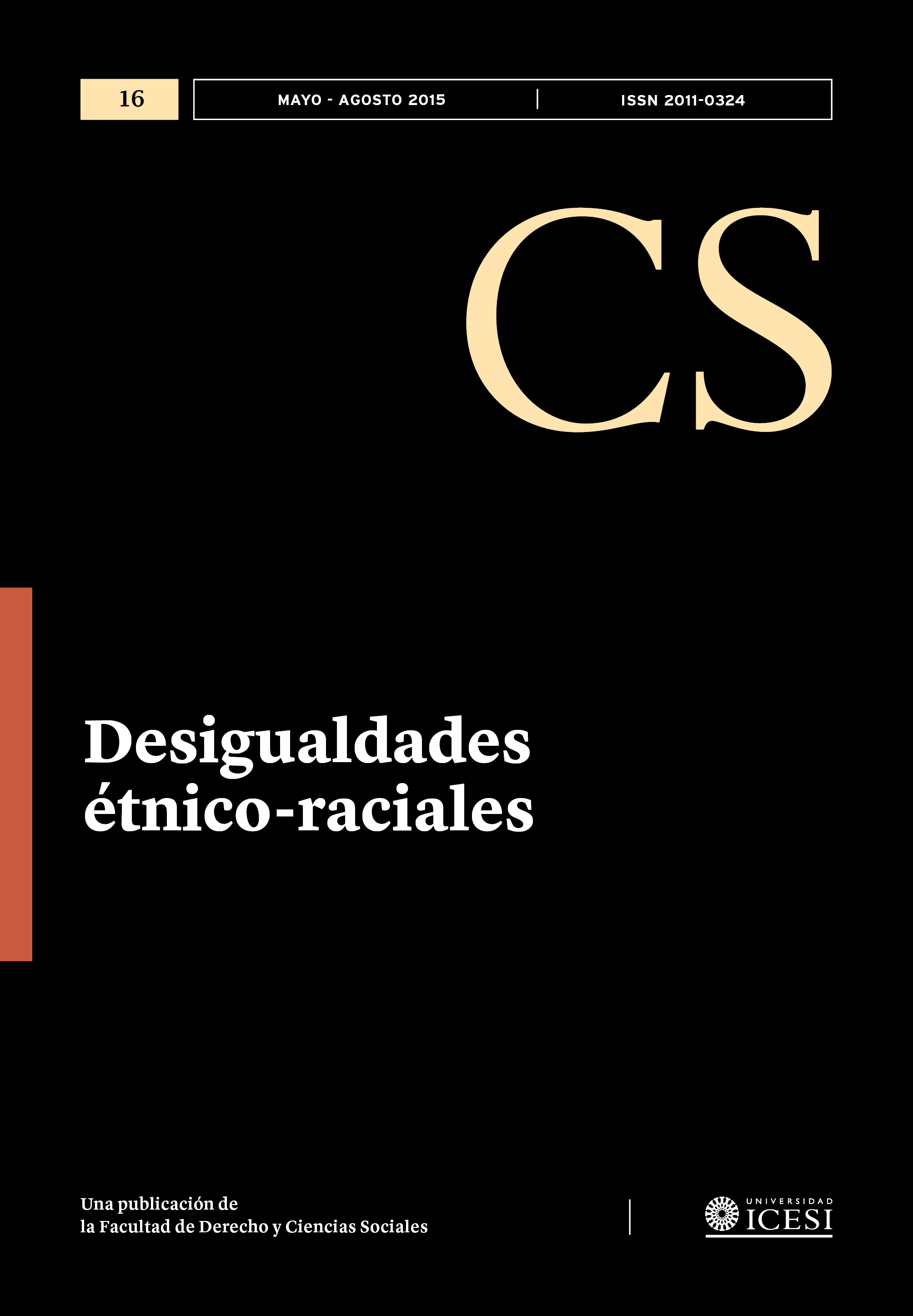Ambiguidades em duas décadas de paradigma multiculturalista. Alguns elementos da história imediata dos Afro-colombianos
DOI:
https://doi.org/10.18046/recs.i16.1967Palavras-chave:
Multiculturalismo, Afro-colombianos, Negros, Autofagia, BiodiversidadeResumo
A história imediata dos afro-colombianos está marcada por uma série de avanços, confusões e retrocessos; todo um acontecimento que ao ser analisado cuidadosamente revela a ambiguidade presente no paradigma multiculturalista. Paradigma a partir do qual tem se procurado organizar a sociedade de tal forma que se faça justiça às “minorias” historicamente maltratadas pela discriminação cotidiana e estrutural existente na sociedade colombiana. Neste sentido, neste artigo se pretende contrastar o que está expresso na Constituição política de 1991, a Lei 70 de 1993, material bibliográfico pertinente ao tema e à realidade dos afro-colombianos, o que permite chegar à conclusão que as bondades conquistadas pelos afro-colombianos após estas duas décadas de multiculturalismo não se comparam com as perdas que estão enfrentando. Argumenta-se que, se bem que as políticas afirmativas, o discurso do reconhecimento tem sido tolerado e respeitado por uns setores da sociedade colombiana, um grande número de colombianos continua tendo uma atitude negativa com relação aos afro-colombianos.Downloads
Referências
Bushnell, D. (1996). Colombia una nación a pesar de sí misma. Bogotá, Colombia: Editorial Planeta.
Césaire, A. (2006). Discurso sobre el colonialismo. Madrid: Editorial Akal.
Colectivo Observatorio de Conflictos Ambientales (2012). Comunicado del 7 de agosto 2012: Asunto sentipensante apropósito de un traidor. Recuperado en: http://www.prodefensaunipacifico.blogspot.com
Du Bois, E. (2001). Las Almas del pueblo negro, Ciudad de la Habana, Cuba: Fundación Fernando Ortiz.
El espejismo de la minería. Video producido por el Observatorio Pacífico Territorio, sf, en: http://www.pacificocolombia.org/
Erazo Gómez, A. (2012). “La Ley 70 de 1993 y la participación política de las comunidades negras”. En: Trans-pasando Fronteras, núm. 2, pp. 31-45. Cali: Universidad Icesi.
Escalante, A. (1971). La Minería del Hambre, Medellín, Colombia: Ediciones Universidades Medellín.
Fanon, F. (1973). Piel Negra, Mascaras Blancas. Buenos Aires: Editorial Abraxas.
Foucault, M. (1991). Sujeto y poder, Bogotá, Colombia: Editorial Carpe Diem.
Jameson, F y Zizek, S. (2003). Estudios culturales. Reflexiones sobre el multiculturalismo. Buenos Aires, Argentina: Paidos.
Malcolm X (1993). Habla Malcolm X, Discursos, entrevistas y declaraciones. Nueva York, EE.UU.: Pathfinder.
Memmi, Albert. (1969). Retrato del colonizado. Buenos Aires: Ediciones de la Flor.
Nietzsche, F. (2000). Genealogía de la moral, Bogotá, Colombia: Emfasar Editores.
Ortiz, F. (1993). Etnia y sociedad. La Habana: Editorial de Ciencias Sociales.
Pérez, B. (s.f.). “Santos y su ‘locomotora minera’”. En: http://www.arcoiris.com.co/2012/08/02 santos-y-su-locomotora-minera/
Polo, M. (2000). Libro de las maravillas. España: Edición de Ediciones.
Quijano, Aníbal. (1999). “¡Que tal raza!”. En: Revista Ecuador Debate, núm. 48. Etnicidades e identificaciones. Quito: CAAP.
Said, E. (1990). Orientalismo, Barcelona, España: editorial al Qibla ensayo IBN Jaldun libertarias.
Said, E. (1996). Cultura e Imperialismo, Barcelona, España: Editorial Anagrama.
Valencia, L. E. (2010). La invención del ‘negro’ y del ‘Afro’ [Tesis de Maestría]. Cali, Colombia: Universidad del Valle.
Valencia, L. E. (2014). “Los afrocolombianos entre avances, confusiones y retrocesos en dos décadas de paradigma multiculturalista”. En: Documentos de Trabajo del CIES, núm. 02. Cali, Colombia: Universidad Icesi
Downloads
Publicado
Edição
Seção
Licença
Copyright (c) 2015 Luis Ernesto Valencia Angulo

Este trabalho está licenciado sob uma licença Creative Commons Attribution-NonCommercial 4.0 International License.
© Direitos autorais reservados
O material desta publicação pode ser reproduzido sem autorização, desde que o título, o autor e a fonte institucional sejam citados.
O conteúdo publicado na Revista CS é distribuído sob a licença Creative Commons BY-NC 4.0 Attribution/Attribution-NonCommercial 4.0 International.
Você tem o direito de:
Compartilhar — copiar e redistribuir o material em qualquer suporte ou formato.
Adaptar — remixar, transformar, e criar a partir do material.
De acordo com os termos seguintes:
Atribuição — Você deve dar o crédito apropriado , prover um link para a licença e indicar se mudanças foram feitas . Você deve fazê-lo em qualquer circunstância razoável, mas de nenhuma maneira que sugira que o licenciante apoia você ou o seu uso.
NãoComercial — Você não pode usar o material para fins comerciais.











